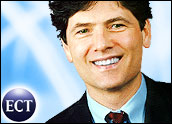
For decades Sage Software has focused on the mid-market and SMB space, selling a variety of accounting back office and CRM oriented front office applications around the world, but the company has always been something of an odd duck in the business software market.
For starters, Sage has been through a number of name changes — it was known in America at least as Best Software for a while. More importantly, unlike the vast majority of vendors in the business software market who sell through massed armies of direct representatives, Sage has made a science out of selling through a militia of resellers — a channel that many other vendors, now suddenly interested in the lower end of the market, overtly covet.
With a little cash, some training, and a lot of hard work, people with entrepreneurial drive can become resellers of Sage products, carving out their own niches in a market that still rewards ambition. It is, simply, the American dream, updated to the 21st Century. Sage has not always had the most up-to-date technology; for example, the contact manager ACT! relied on a flat file system until a couple of years ago, but no one seemed to mind. The product delivered needed functionality at a price point that was attractive to millions of small users and that seemed more important.
Nashville Cats
Last week, in Nashville, Tenn., Sage held its annual meeting with partners (and press) that was part reward for jobs well done last year, part motivation (Stephen Covey gave a keynote), and part schmooze as 3000 people convened to listen to Bill Cosby one night and go out on the town another.
Beyond all that, there were numerous announcements worth paying attention to. For instance, the company, which is still better known for its individual products (MAS, PeachTree, AccPac accounting and ACT!, SalesLogix, and SageCRM for the front office to name a few) than its corporate brand, announced global revenues of nearly US$800 million in the first half of the fiscal year.
Impressive Results
Perhaps even more impressive was the announcement that the company now has 5 million customers — not merely deployed seats but actual companies that have put down cash for its products. About half the customers are located in North America and on a global basis that makes this company that sells multiple business software products through a reseller channel one of the biggest business software companies on the planet.
The channel strategy may be Sage’s secret sauce because while many other vendors might want to emulate Sage’s success, the cold reality is that channels are not built overnight — without partners, channel strategies unfold slowly. Partners evolve at their own rates based on individual resources and ability to take advantage of channel incentives. So there is tremendous cohesion in a partner channel due to the costs involved in switching. To net this out, Sage has a channel that many other vendors would love to woo away.
Loyalty Effect
Most important to my eyes and ears, was the messaging that infused the proceedings. More than any other vendor I have seen to date, Sage appears to have internalized the idea of customer-centricity on levels that include not only their direct customers but their customers’ customers as well.
While almost anyone with a pulse can talk about loyalty these days (and confuse it with satisfaction), in his keynote, Sage CEO Ron Verni, spoke knowingly about net promoter scores and quoted from books by some of the experts in the field like Fred Reichheld (The Loyalty Effect, The Ultimate Question). Not bad at all.
Perhaps due to the nature of Sage’s multi-tiered business model, the company has experienced earlier and more deeply the importance of alignment with its customers. Many companies that have sold through only one tier for years are only now waking up to the fact that loyalty is a long-term commitment, not simply the upshot of the last interaction, which is really all that satisfaction boils down to.
Looking Ahead
If it steers the right course, Sage may now find itself in a very convenient position relative to the market. The reason is that the company is among a small few — another would be NetSuite — that has both front and back office solutions in its arsenal. Unlike NetSuite, which makes much of its pre-integrated accounting and front office solutions, Sage’s portfolio is still a mix of individual front and back office solutions that its channel partners might integrate at various levels. Nonetheless, one of Sage’s strengths is the depth and variety of its back office solutions which some will prefer over pre-integrated but less varied choices.
The number one job for Sage today should be in providing integration technology so that its customers and resellers can select from among its front and back office products to arrive at “just-right” solutions that integrate end-to-end business processes. Given the positive sounds about customer-centricity that I heard last week in Nashville, I would expect something is being planned and next year’s meeting message might just be all about that.
Denis Pombriant runs the Beagle Research Group, LLC, a CRM market research firm and consultancy. Pombriant’s research concentrates on evolving product ideas and emerging companies in the sales, marketing, and call center disciplines. His research is freely distributed through a blog and Web site. He is working on a book and can be reached at [email protected]





















































